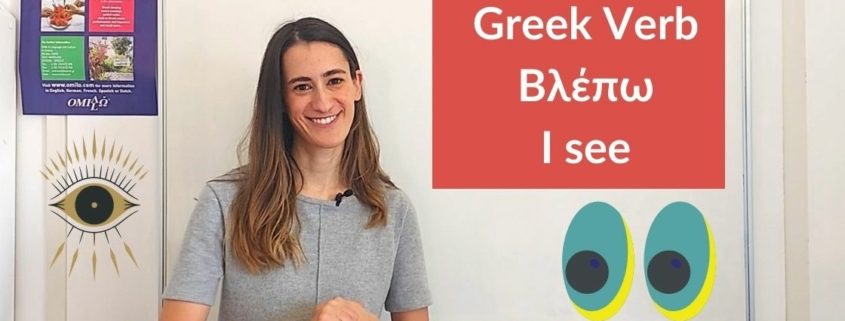The Greek verb for “I see/ I watch” – Learn the present and future form of this verb
Because this is a very useful verb used on a daily basis, here below we will explain the verb “βλέπω”
If you prefer to watch and listen to the video first, then click here and listen to teacher Terpsi
This verb is conjugated the same way as like the verbs (Verb Category A)
έχω (I have),
θέλω (I want),
πίνω (I drink),
and you can also find those verbs in our YouTube language videos list.
Let’s conjugate the verb in the present tense.
Εγώ βλέπ-ω I see / watch
Εσύ βλέπ-εις You see / watch
Αυτός,ή,ό βλέπ-ει He, she, it sees / watches
Εμείς βλέπ-ουμε We see / watch
Εσείς βλέπ-ετε You see (plural form “you”, or polite form “you”) watch
Αυτοί,ές,ά βλέπ-ουν They see / watch
So if you have a balcony with sea view, you can say “Βλέπω τη θάλασσα», —-> “I see the sea”.
Or, if you forgot your glasses, you can say “Δε βλέπω καλά», —> “I don’t see well”.
You can also say “Βλέπω τηλεόραση», —-> “I watch TV”
or «Βλέπω μια ταινία» —> I watch a movie
(Note; in Greek –‘ to see’ or ‘to watch” is the same verb )
This verb can also mean “to meet”. Example;
“Κάθε Σάββατο βλέπω τα ξαδέρφια μου», —-> “I meet my cousins every Saturday”.
Let’s now learn the verb in Future Tense
Εγώ θα δ-ω
Εσύ θα δ-εις
Αυτός,ή,ό θα δ-ει
Εμείς θα δ-ούμε
Εσείς θα δ-είτε
Αυτοί,ές,ά θα δ-ουν
So if you want to say “I will watch a series tonight”, you will say “Θα δω μια σειρά απόψε».
Or if you want to ask somebody if they will see someone, you can ask “Θα δεις τη Μαρία αύριο;“” –> “Will you see / meet Maria tomorrow?”
Expressions used on a daily basis in Greece
“Θα δω», —> “I will see”.
Or
“Θα δούμε» —> we will see
For example,; if somebody asks “Θα έρθεις αύριο στο πάρτι;» (Will you come to the party tomorrow?” )
, but you are not sure yet, you can answer;
-Θα δω. (I will see)
-Θα δούμε. (We will see)
CAREFUL : This does NOT mean “See you”, but “We will see”
If you would like to say “See you”, then you use another verb in Greek.
Click here to learn the difference between “see you” and “we will see”, and how to say those expressions in Greek.
+++++++++++++++++++++++++++++++++++++++++++++++++++++++++++++++
If you like to communicate in Greek, then, apart from grammar, you also need to learn the correct pronunciation in Greek 😉
Take a look at the video below and listen to the correct pronunciation of the conjugations and sentences.
Hope you liked this Greek language lesson.
If you want to learn more Greek verbs and tenses, then
click here to learn the verbs “to drink” and “to be hungry”.
Click here to learn the verb ‘to understand’
Click here to learn the verb ‘to speak’
Click here to learn the verb “to come”
Are you a beginner learning Greek, and you would like to have an overview and grammar introduction
 of how to conjugate several verbs of this GROUP A verbs?
of how to conjugate several verbs of this GROUP A verbs?
Then take a look at this eBook, including videos and grammar explanations
+++++++++++++++++++++++++++
++++++++++++++++++++++++++++++++++++++++











